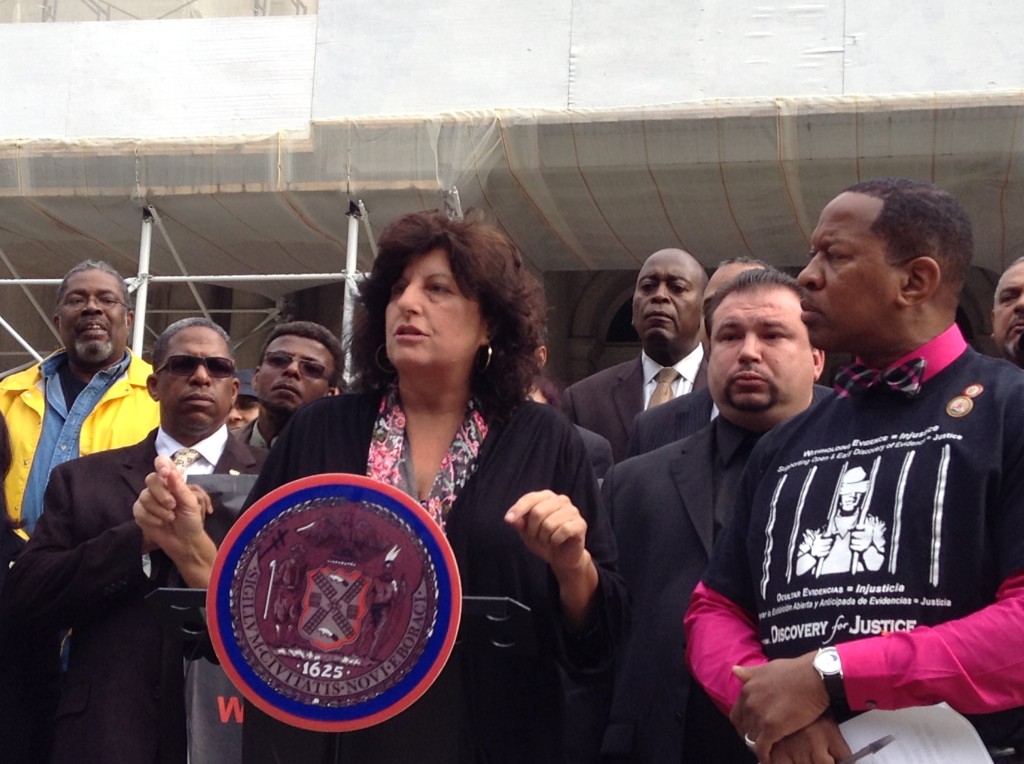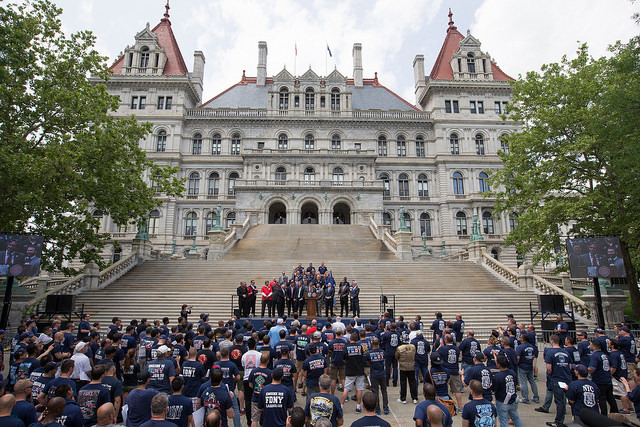Keeping New York Water Clean

Seneca Lake (photo via @NYGov)
Do you enjoy a pumpkin spice latte during the crisp fall weather? A warm cider, perhaps? No matter your drink of choice, it is ask risk of being more dangerous than delicious as Congress and federal courts have frozen the Clean Water Rule, instituted on August 28. The Clean Water Rule would have ensured that your beverages are clean and tasty, but officials are leaving us all vulnerable.
At the end of this summer, the U.S. Environmental Protection Agency's Clean Water Rule reinstated Clean Water Act protections to 28,785 miles of streams across New York and over 2 million nationwide that were previously open to pollution. This meant that drinking water for over 11 million New Yorkers, 55 percent of the state's population, was safe from the toxic chemicals that industry dumps into waterways.
The new Clean Water Rule finally gave the EPA the power and jurisdiction it needed to keep water clean and us healthy. From clean water advocates who dedicate their lives to this work to farmers, small business people, elected officials, and the citizens of neighborhoods across America, people from all over the country have campaigned to institute this rule. It is an issue that affects each and every one of us.
Clean drinking water is a basic right. Without clean water, not only does our quality of life decline, our economy slumps along with it. It is eye-opening to discover the importance clean water holds in everyday lives, and it is frightening to learn how much it is being threatened.
Big business, such as large-scale farming and oil and gas companies, have been fighting this rule since its enactment. It is upsetting that these businesses are willing to risk the lives of their consumers for short-term profits. The Senate recently sided with special interests by voting to dismantle the Clean Water Rule. President Obama has stated that he will veto their dangerous bill, and we need our senators who care about our public health to uphold this veto. Americans deserve to be able to swim, boat, eat fish, and drink water without worrying about the health repercussions of water pollution.
Luckily, New Yorkers have responsible and forward thinking officials. Senator Schumer is standing strong in his commitment to clean water and is standing guard against attempts to dismantle the Clean Water Rule in the budget process. A hero among members of Congress on this issue, Schumer must continue advocating for clean water and being an example for the rest of the Senate. As New Yorkers, we need to support his efforts and make our voices heard as loudly as those of the polluters.
***
Anubhuti Kumar is Media Intern at Environment New York, a statewide, citizen-funded advocacy organization working for the places we love and the environmental values we share. On Twitter: @EnvNY.
Prison Alternatives Enhance Public Safety & Must Be Left in Place

The author at a rally
As New Yorkers, we are all deeply saddened by the recent death of NYPD Officer Randolph Holder. But as we mourn and seek answers to this tragedy, we must not repeat the mistakes of past decades and allow retributive impulses to supersede evidence-based approaches to public safety.
People in drug diversion programs return to the community, as do 95 percent of people sent to prison. However, unlike incarceration, diversion successfully addresses some of the root causes of crime. Rolling back diversion programs that have increased public safety and lowered prison and jail populations would be a dangerous mistake and send a signal to policymakers across the country that New York is bound by the politics of fear.
As a public defender in Brooklyn for more than thirty years, I have seen firsthand the devastating effects of the combination of failed drug policies, disproportionate sanctions and mandatory minimums.
By the 1980s, it was becoming clear to public defenders, district attorneys, and judges alike that incarceration of poor people of color was not making our neighborhoods safer. Instead, it ensnared entire communities in an epidemic of criminal justice involvement, leaving untold numbers of New Yorkers—the vast majority low-income people of color—with the enormous burden of criminal records, in addition to the unmet mental health needs, untreated addiction, cyclical poverty, and multi-generational trauma that likely precipitated their arrests.
In Kings County we did not wait for reform of ineffective laws and decided to do something different— creating diversion programs beginning in the late 1980s and early '90s to allow defendants to enter drug and mental health treatment to address the conditions that prompted the criminal behavior in the first place. The theory was, and still is, that high quality diversion programs and treatment courts for the adjudication of cases for appropriate candidates would keep us safe, save money, and promote confidence in a troubled system. Support for these programs among politicians has varied over the years, but their success has always been validated by statistical evidence.
The point of diversion is public safety. We know that people who are given the opportunity to get clean, find stable housing, develop work skills, and avoid the collateral consequences of a conviction are much less likely to re-offend. In New York City, people who complete drug programs have a 36 percent recidivism rate, as compared to 54 percent for those sentenced to prison, jail, probation, or time served, according to a 2015 report by the Vera Institute of Justice.
To be sure, drug treatment and other court mandates can never address all of the reasons that people commit crimes. Likewise, because the success of these programs is contingent on defendants continuing to live in the community, there is an inherent risk that a small number of individuals will not comply with the mandates of the court. Incidents like Detective Holder's death, though tragic, are extremely rare. In fact, a 2000 study of diverted felony drug offenders showed that they pose no more of a risk to public safety than those traditionally prosecuted.
Brooklyn Defender Services handles over 45,000 cases a year; nearly 2,000 of our clients benefit from specialized treatment courts in Kings County annually. Two clients, Mark and John (names changed to protect their identities) have cases that are illustrative of the important role that alternatives to incarceration play in promoting public safety and helping people to improve their lives and those of their families and communities.
John, arrested in an undercover drug sale, has cognitive limitations. He accepted a conditional plea that included connection with services from Brooklyn Forensic Link, a program that assists severely mentally ill offenders each year with treatment and related transitional services. With the support of Brooklyn Forensic Link, he completed the terms of his conditional plea within six months and now receives much-improved access to services to help him navigate the city despite his disability.
Another client, Mark, was arrested for breaking into stores to steal money to support his heroin habit. Mark's case was transferred to drug court. He has already completed the inpatient portion of his treatment, is currently participating in outpatient treatment, now holds a job in construction, and recently became engaged to be married.
Their stories of success are repeated thousands of times each year. Yet I remember a time when Mark and John would have had no options other than incarceration, without the benefit of programming to prevent future contact with the criminal justice system.
Those who forget the past are doomed to repeat it. While we still have far to go, New York has taken important steps towards criminal justice reform. Safe and effective use of diversion programs began in Brooklyn and later served as the blueprint for reforming the Rockefeller Drug Laws in 2009. These programs reduce crime: arrests are down and fewer people are spending unnecessary time in jail or prison.
There is no doubt that the death of Randolph Holder deserves thoughtful pause. We are New Yorkers—thinkers and doers. We dishonor Officer Holder's service if we roll back hard-fought reforms that have made New York safer for everyone. The proposals urged thus far—fragmented bail reform, limiting access to diversion and adjustment of the sealing statutes—will not prevent future tragedies. Instead, they will hurt the thousands of New Yorkers who already suffer the most—poor people of color and the communities in which they live and work.
***
by Lisa Schreibersdorf, Executive Director of Brooklyn Defender Services. On Twitter @BklynDefenders.
***
Have an op-ed idea or submission for Gotham Gazette? E-mail editor Ben Max: This email address is being protected from spambots. You need JavaScript enabled to view it.
Wall Street Doesn’t Work for New York, Let’s Create a Bank that Will

A rally at the capitol (photo: Governor's Office via flickr)
This summer treated New Yorkers to a spectacular display of the vulnerabilities of the New York region’s century-old subway system. Hardly a day passes without a rush hour social media meltdown because of delays and service interruptions. The MTA’s own data back this up: the authority is struggling to keep pace with historically high ridership while also upgrading the system.
The recent agreement struck between Governor Cuomo and Mayor de Blasio to fund the MTA five-year capital budget is encouraging, but it does not in any significant way address the agency’s failure to build and maintain infrastructure with cost-efficiency. The MTA will likely find much of the funding for the capital budget by taking on more debt.
In light of these struggles, recent (and upcoming) increases in subway fares should draw out the pitchforks -- or they would, if straphangers knew that most of the money doesn’t go to services for riders, but to paying MTA debt service, which has reached the size of whole national economies. According to the MoveNY Fair Plan, 17 percent of the MTA operating budget is spent on debt service. That’s equivalent to 47 cents of every MetroCard swipe -- and that number is rising.
Bringing MTA capital costs under control will require an overhaul of the agency’s organizational practices across the board, but why should large banks benefit from our daily commuting woes? Let’s cut Wall Street out of the equation and create a bank for the people of New York. We should be financing MTA capital projects, along with many other public goods, with a state-owned public bank.
By allowing the MTA to consolidate and refinance its debt at better rates, a public bank for New York would make available more funds for getting the New York region’s transit infrastructure to a state of good repair and expanding the transportation network.
A state bank can and should address other issues as well. It would support local community banks and credit unions in small towns and rural communities in places like Rensselaer, Niagara, and Allegany counties to make more small business and agricultural loans. It would offer competitive financing and loan products for new green technology and energy investments. By supporting local community banks and credit unions, perhaps in conjunction with a pilot program to offer banking services at post offices, it could crowd out predatory check-cashing businesses.
Finally, it would create a means for refinancing student loans, taking the strain off straphangers and students--two constituencies in which Governor Cuomo has shown limited interest.
The Bank of New York would be professionally staffed and independent from, but accountable to, both a citizen advisory board and elected representatives. Funds from state and local treasuries and from public benefit corporations like the MTA would make up the bank’s deposits.
Four times since 2011, lawmakers in Albany have introduced legislation to study a potential Bank of New York, but it has never been given a vote. It will take a social movement to make it happen. This is how reformers established the only existing state bank in the nation, in North Dakota, when a progressive populist movement swept the corrupt establishment from power. These actions helped communities weather the Great Depression, and today the Bank of North Dakota has bipartisan support from a broad range of constituencies in that deep red state.
Taking control of finance by creating a public bank sounds radical, but “radical,” which comes from the Latin word for “roots,” only means getting to the root of the problem. Sometimes it’s not enough to trim the weeds -- you have to pull them out and plant something new. Finance, like electricity, water, or the internet, is a public utility and can be harnessed for the public good or enrich a few. We've been doing the latter. We know that the Wall Street way isn’t working, but we’ve been sticking to it because we don’t yet see alternatives.
A state bank would pull out some Wall Street roots and plant new seeds based on economic democracy, a system that puts greater power in the hands of the people and communities that create our common wealth. Economic democracy is a deeply American tradition stretching from Thomas Paine to the agrarian anti-renters and Free Soilers of 19th century New York, to the leaders of the Civil Rights Movement who built institutions for community ownership in the Jim Crow South and marched on Washington for jobs and freedom.
Like any one part of a larger whole, a state bank alone won't solve all of our problems--transit or otherwise. But New Yorkers across the political spectrum see that our current system doesn’t work, and with greater economic democracy we have a systemic alternative.
A public bank would serve all New Yorkers: working and farming families, students and small business owners, drivers and straphangers. A coalition drawn from those constituencies would quickly transform any “radical” notion into a common sense solution. A state bank is one tool for the people of New York to push back against Wall Street power, move our economy forward and help us invest in the future of our transit system and our state as a whole, from Buffalo to Plattsburgh to Brooklyn.
Rather than waiting for Albany to do right by the people of New York, New Yorkers can promote these structural changes by voting “yes” in the constitutional convention referendum that will be on the ballot in 2017.
***
Matthew Rigney is a Master of City and Regional Planning candidate at Rutgers University. Evan Casper-Futterman is a PhD candidate in Public Policy at Rutgers University.
***
Have an op-ed idea or submission for Gotham Gazette? E-mail editor Ben Max: This email address is being protected from spambots. You need JavaScript enabled to view it.




